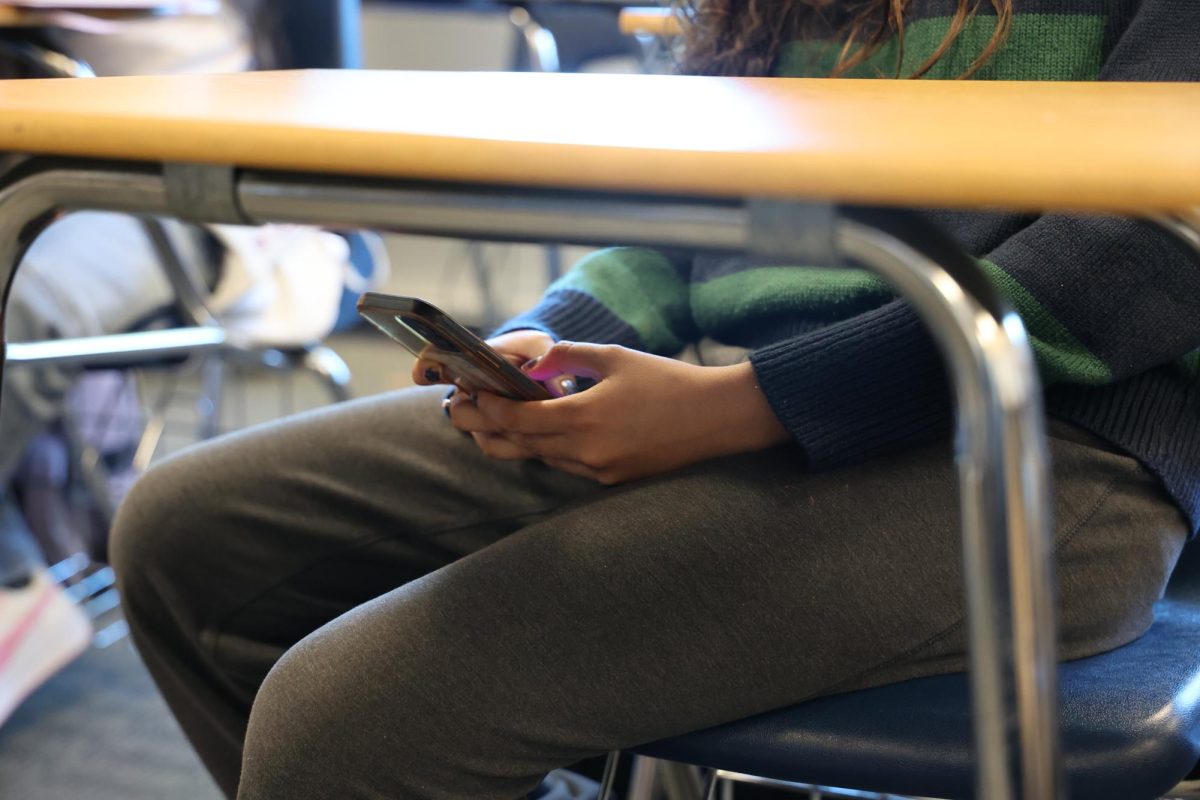California governor Gavin Newsom signed Assembly Bill 3216, the Phone-Free Schools Act, on Sept. 23, 2024, prohibiting cell phone use during school hours in all districts state-wide. Entering the 2024-2025 school year, SCUSD issued a mandatory cell phone policy for all schools that requires the creation of a set of rules that regulate cell phone use starting July 1, 2026.
SCHS implemented a ban on phones during class time. Students and staff have mixed opinions about the new policy, as there are pros and cons to removing cell phone distractions in classrooms.
SCHS was a step ahead, according to Vice Principal Teresa Posas. She said after the school decided to be phone-free, California passed the Phone-Free Schools Act. AB 3216 was passed due to the rate of cyberbullying, academic dishonesty and student overall academic performance.
SCHS’s administration believed students were getting lost in their phones, distracted and socially uninterested. Posas stated that the SCHS staff set the new policy in motion to help students obtain all of the knowledge they can.
“Being on your phone all the time creates challenges where you don’t interact with others, where you’re not paying attention to the teacher, and then it causes a distraction,” Posas said. “As a staff, (we) looked at these behaviors and thought, ‘How can we address it without going completely no cell phones?’ It was something that we decided at the site.”
Students, however, were not aware of the new rule. Administrators were going to hold class meetings and inform the students about the policy. Science teacher Sara Carvalho found the new cell phone policy challenging to carry out due to students not knowing about the rule.
“I think the biggest obstacle getting it implemented was from day one because I think the original plan was that it would be implemented after you guys (students) had your class meetings, and that just wasn’t going to work for us,” Carvalho said. “We had a push for it to be implemented from the first day of school and not from a week in. Once we all agreed to do that, then it was fine.”
Not all students feel connected to their phones. Junior Isabel Antony received a phone later than most of her peers and explained she feels less attached. She believes the cell phone policy is an advantage for her due to not being as addicted to a phone.
“I got my phone from my parents later on compared to a lot of my friends, and I think because of that, I was less on social media,” Antony said. “As a result, my habit isn’t as strong as other people’s for getting on my phone.”
Posas explained there is a communal understanding that the cell phone policy is for the greater good of the students
“It’s not coming from a place of harm,” Posas said. “We don’t want to harm anybody. You might be upset because you’re so attached to your phone, but it’s really coming from a place of us wanting students to be more present.”
Carvalho mentioned she keeps track of student progress each school year. This year, with the removal of phones, students are accomplishing their work much faster.
“It takes students less time to complete work. I keep a calendar every year, and I’m definitely moving through my information faster. Students are finishing things faster probably because they’re not distracted,” Carvalho said. “There just seems to be more real socializing, like students talking to each other and actually conversing with each other, which is kind of new.”
Antony has fears that if something were to happen, students would not be able to reach out for help. She, however, trusts her teachers will do the right thing in case of an emergency.
“If there’s a school shooting and you don’t have your phone, how are you supposed to message your parents? I think that is worrisome,” Antony said. “I do know that your teachers will have their (student’s) phones. They wouldn’t hide it somewhere in a pouch.”
Though some teachers store phones in phone boxes, Carvalho does not. She mentioned the students will still be able to access their phones in a quick manner in case of emergencies.
“Students still have access to their phones, so it’s a good compromise,” Carvalho said. “It’s not like their phone is far away from them. If anything happens, they can just grab their phone quickly.”
Teaching students healthy habits, Carvalho said, is the purpose of the policy. She explained that wanting to use a phone can be a habit, and it is up to the adults to break bad habits and implement good ones.
“It’s a physiological response, the release of dopamine, the release of serotonin. It makes you happy. It connects you to the world. You aren’t missing out on anything,” Carvalho said. “Teenage brains aren’t fully developed, so I think teaching students the proper phone usage, saying, ‘Right now is not a good time to use your phone’ is really important.’”


